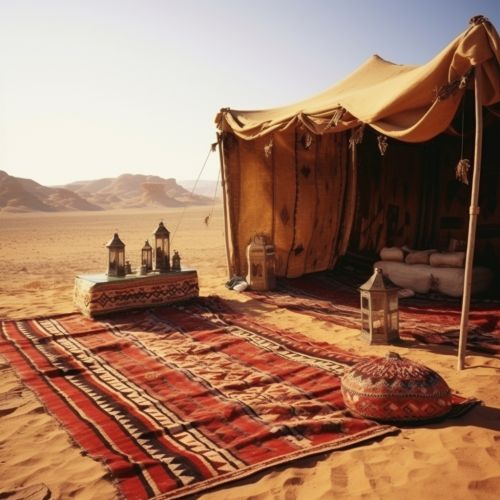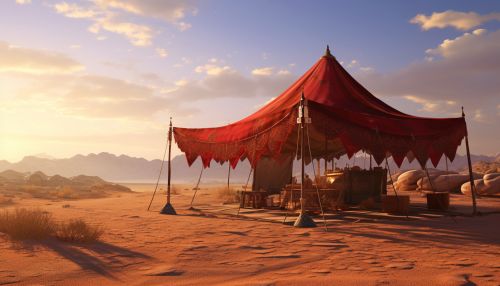Bedouin
Origins and History
The Bedouin are a group of nomadic Arab people who have historically inhabited the desert regions in North Africa, the Arabian Peninsula, Iraq and the Levant. The term "Bedouin" is derived from the Arabic word "badawī", which means "desert dweller". Their history and culture are closely tied to the Arabian desert, where they have lived for centuries.
The Bedouin culture originated in the Arabian Peninsula, around 1000 BC, when tribes from the northern part of the peninsula began to migrate to the south. The harsh desert environment shaped their way of life, making them expert survivalists. They developed a nomadic lifestyle, moving from place to place in search of water and pasture for their livestock.


Society and Culture
Bedouin society is tribal, with each tribe functioning as a self-contained unit. The tribe, or "ashira", is the basic social unit in Bedouin society. Each tribe is led by a sheikh, who is chosen based on his wisdom, bravery and generosity. The sheikh is responsible for settling disputes, making decisions and providing for the welfare of the tribe.
The Bedouin have a rich oral tradition, with poetry and storytelling being important parts of their culture. Poetry, in particular, is highly valued and is often used to express emotions, tell stories, and convey social and moral values. Music and dance are also integral parts of Bedouin culture, with traditional dances like the "ardha" and "khaleegy" being performed on special occasions.
Economy
The Bedouin economy is primarily based on livestock herding, with camels, sheep and goats being the main animals raised. The Bedouin use the milk, meat and hides of these animals for food, clothing and shelter. In addition to herding, the Bedouin also engage in trade, often serving as middlemen between different regions.
In recent years, many Bedouin have transitioned from a nomadic lifestyle to a more sedentary one, often due to the pressures of modernization and state policies. This has led to a shift in their economic activities, with many Bedouin now engaged in agriculture, wage labor and even urban professions.
Religion
The Bedouin traditionally practiced a form of polytheistic religion, but with the advent of Islam in the 7th century, the majority of Bedouin tribes converted to Islam. Today, the Bedouin are predominantly Sunni Muslims, and Islam plays a central role in their daily lives. The Bedouin observe the Five Pillars of Islam, which include faith, prayer, charity, fasting and pilgrimage.
Modern Challenges
Modernization and state policies have posed significant challenges to the Bedouin way of life. Many Bedouin have been forced to abandon their nomadic lifestyle and settle in urban areas. This has led to a loss of traditional culture and skills, and many Bedouin now face poverty and marginalization.
In addition, the Bedouin face ongoing land disputes with various governments, particularly in Israel and the Occupied Palestinian Territories. These disputes often result in forced evictions, home demolitions and restrictions on their traditional way of life.
